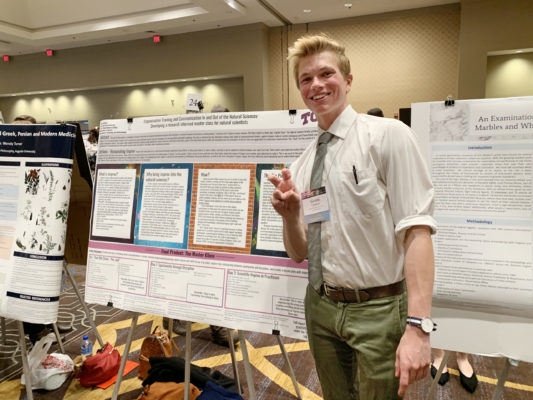Grant Lattanzi came to TCU with aspirations of an acting career. However, after his experience conducting an independent research project, his dream changed course. “My career trajectory has completely changed from career actor to aspiring professor,” he said.
For his project, “Improvisation Training and Communication In and Out of the Natural Sciences: Developing a research-informed master class for natural scientists,” Lattanzi leveraged his personal experience as an actor and merged it with what he saw as rising risks in education, specifically high rates of class absenteeism in the natural sciences and a growing dependence on lecture and PowerPoint usage. After conducting two separate literature reviews – one on improvisational theatre and the other on natural science education – he designed a three-day master class to help scientists develop a new kind of lecture plan utilizing the principles of improvisation.
The class uses the “Harold” model of improv (an advanced improv structure comprised of three separate ideas that connect at the end) to build a communication method that improves outcomes for students receiving natural science instruction.
Lattanzi knew he wanted a chance to present at an academic conference, so when he received an email from Honors asking for conference submissions, he jumped at the opportunity. “I had a vague idea of what I proposed,” he admits. “[However], it was a cool way to challenge myself to undertake a big new project.”

The hard work paid off. With funding from Honors, Lattanzi presented his research at the National Collegiate Honors Council (NCHC) conference in New Orleans in fall 2019. The conference provided a valuable networking opportunity as he interacted with and learned from other students, staff and faculty from across the country. He was one of six TCU Honors students and numerous Honors faculty and staff members who participated in the conference.
“This was my first experience presenting at a conference,” he said. “I got some great feedback from the judges at the conference and the other folks from the Honors College who attended.” His favorite part of the conference included the student interdisciplinary research panels. “It is such a unique forum to have really profound and important discussions,” he said.
Undergraduate research is a notable pillar of the TCU Honors experience – students have an opportunity to participate in research typically offered at a graduate level and benefit from close professional mentoring relationships with professors. Honors is committed to supporting students’ inquisitive intellectual and creative research pursuits by offering grants and funding for conference attendance.
“I don’t think I’d have found a passion for research without my experience in Honors,” Lattanzi said. “Pretty much everything I’ve learned about it has come from my experience in my classes and writing my Honors thesis… I don’t think I’d have had the courage to undertake my NCHC project without my experience in Honors.”